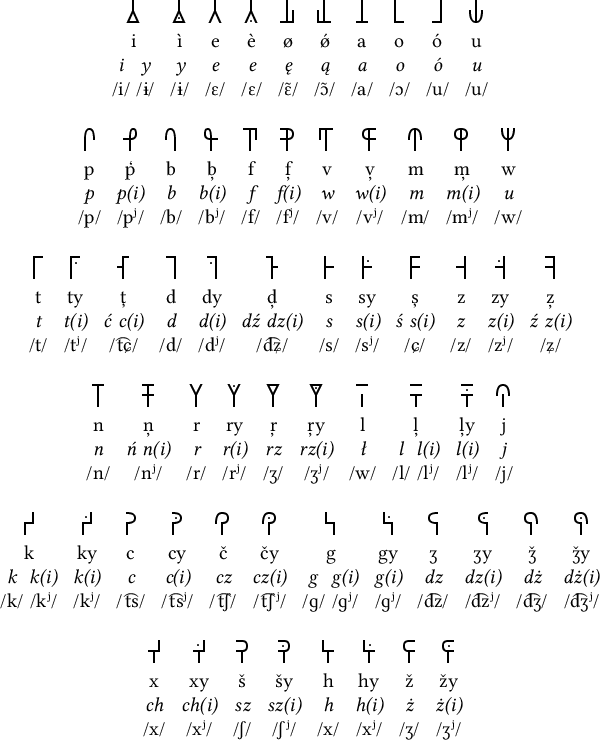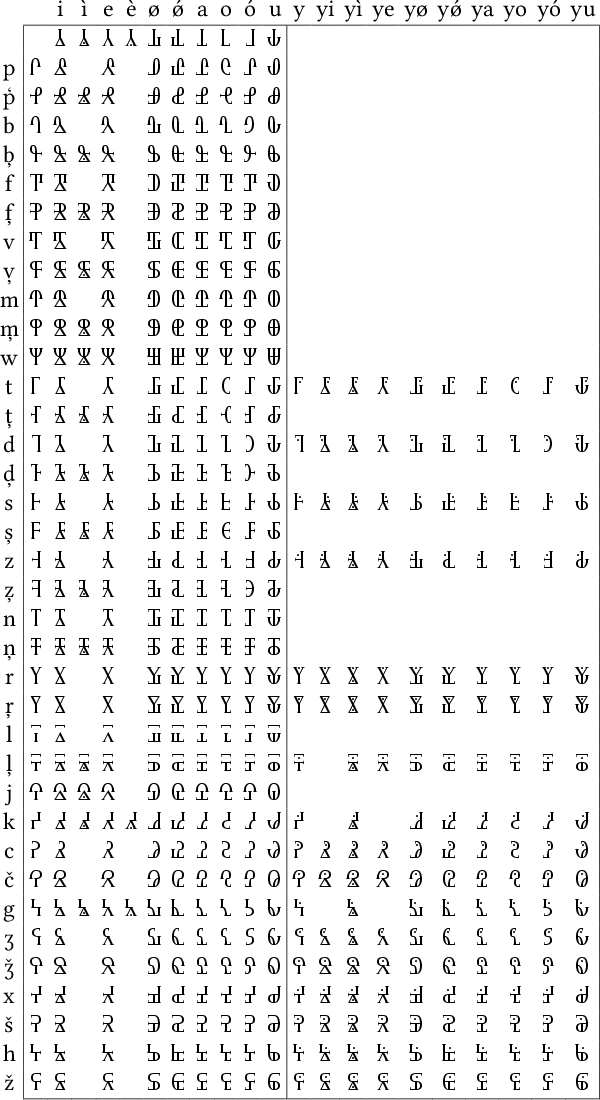Sylabitsa /sɨlaˈbiʦa/ is an alternative alphabet for Polish invented by Marcin 'Qrczak' Kowalczyk in 1990. Since then it has undergone a number of revisions. Sylabitsa was inspired by Japanese hiragana and katakana, although it's looks more like Korean hangul.
Like in the standard Polish orthography, the spelling of Sylabitsa is not strictly phonetic, but retains some underlying structure which has been obscured by later phonetic changes of the language. This principle goes sometimes further than in the standard orthography.
The etymological spelling for Polish (ortografia etymologiczna) is a Sylabitsa transliteration scheme which uses a modified Latin alphabet. It can be easily and unambiguously converted to and from sylabica, whereas conversion between any of them and the standard orthography cannot be fully automated. The abstract spelling can be used as an alternative Polish orthography.
In the following table the 1st row shows a sylabica letter, 2nd — its abstract Polish spelling, 3rd — its standard Polish spelling (where e.g. p(i) means p before i or pi before a vowel), and 4th — its pronunciation in the regular case (where /j/ may be treated either as a separate phoneme which is omitted when it would be followed by /i/ or /j/, or as a mark at the previous consonant indicating that it's palatal, depending on how the Polish language is modeled).



Všisci l̦ud̦e roʒǿ șø vol̦n̦i i róvn̦i pod vzgl̦ødem svej godnoșți i svix prav. Sǿ on̦i obdar̦en̦i rozumem i sum̦en̦em i pov̦inn̦i postøpovaț vʼobec innix v duxu braterstva.
Wszyscy ludzie rodzą się wolni i równi pod względem swej godności i swych praw. Są oni obdarzeni rozumem i sumieniem i powinni postępować wobec innych w duchu braterstwa.
All human beings are born free and equal in dignity and rights. They
are endowed with reason and conscience and should act towards one another
in a spirit of brotherhood.
(Article 1 of the Universal Declaration of Human Rights)
Information about Polish | Phrases | Numbers | Time | Terms of endearment | Tongue twisters | Tower of Babel | Learning materials
Further details of Sylabitsa
https://sites.google.com/site/qrczakmk/sylabitsa
If you have any questions about this alphabet, you can contact Marcin at: QrczakMK@gmail.com
Constructed scripts for: Ainu | Arabic | Chinese languages | Dutch | English | Hawaiian | Hungarian | Japanese | Korean | Lingala | Malay & Indonesian | Persian | Tagalog / Filipino | Russian | Sanskrit | Spanish | Taino | Turkish | Vietnamese | Welsh | Other natural languages | Colour-based scripts | Tactile scripts | Phonetic/universal scripts | Constructed scripts for constructed languages | Adaptations of existing alphabets | Fictional alphabets | Magical alphabets | A-Z index | How to submit a constructed script
[top]
You can support this site by Buying Me A Coffee, and if you like what you see on this page, you can use the buttons below to share it with people you know.

If you like this site and find it useful, you can support it by making a donation via PayPal or Patreon, or by contributing in other ways. Omniglot is how I make my living.
Note: all links on this site to Amazon.com, Amazon.co.uk
and Amazon.fr
are affiliate links. This means I earn a commission if you click on any of them and buy something. So by clicking on these links you can help to support this site.
[top]